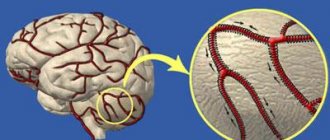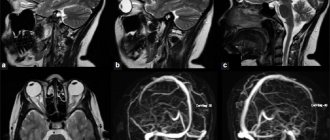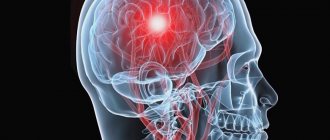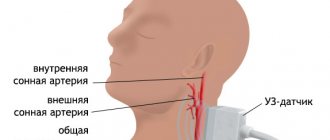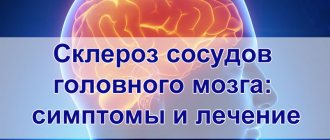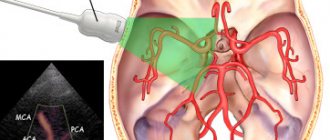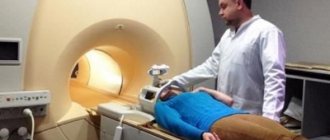Modern lifestyle, poor nutrition and excess weight contribute to the development of diseases of the nervous system. Vasodilator drugs for the brain prevent the occurrence of circulatory disorders and eliminate vascular attacks at an early stage of their development. Medicines are effective for hypertensive cerebral crisis, circulatory disorders against the background of progressive atherosclerosis, and in patients with discirculatory disorders.
Practice of vasospasm therapy
With prolonged vascular impairment, pathological changes develop in the walls of cerebral arteries and veins. For treatment, the patient is prescribed drugs - calcium channel blockers, which have a vasodilating effect and lower blood pressure.
Indications for therapy with calcium channel blockers are the following:
- high blood pressure 200/120—220/120 mm Hg. Art.;
- vascular spasm;
- prevention of ischemic stroke.
During neurosurgical intervention, the patient is given an intravenous drip of vasodilating drugs for the brain. The list of drugs that eliminate cerebral spasms is extensive, but Nimodipine (Nimotop) occupies a special place in it.
The medicine is effective for blockage of a cerebral artery and vasospasm. The drug has the following effect on the patient’s body:
- vasodilator;
- nootropic.
The medicine is prescribed to a patient with severe hemorrhagic stroke. Nimodipine eliminates vascular spasm when administered intravenously. The drug is taken in capsules or through a tube. Nimodipine dilates capillaries and does not worsen the patient's condition upon abrupt withdrawal.
The standard treatment regimen involves prescribing the drug in courses over 3 weeks at a dose recommended by the doctor. The medicine is recommended for patients with high blood pressure.
Vasodilators for hemorrhagic stroke are administered in the first hours after the stroke. The list of emergency medications includes:
- 2% papaverine hydrochloride solution intravenously or No-shpa solution intravenously;
- 2.4% Eufillin solution;
- 1% solution of nicotinic acid with glucose intravenously;
- Instenon IM;
- Stugeron.
The patient is prescribed hypercapnic mixtures: 7% CO₂, 43% O₂ and 50% atmospheric air. The session lasts 5-10 minutes 6 times a day.
Vasodilators act on intact vessels. They are used in complex therapy simultaneously with cardiotonic drugs.
How to reduce the frequency of migraine attacks
To minimize the number of migraine attacks, you will need to reduce the number of factors that provoke the condition when the blood vessels narrow and dilate. This can be achieved by following simple recommendations:
- fall asleep and get out of bed at the same time;
- limit watching television and being in front of a computer monitor;
- perform special exercises for migraines;
- give up alcohol-containing drinks;
- exclude pickles, canned food, and sweets from the diet.
When painful sensations arise, it is best to retire to a darkened room, lie down and sleep for a couple of hours. These steps will also help prevent migraines.
Help for Vascular Cognitive Conditions
Behavioral dysfunction syndrome occurs in a patient after a stroke or as a result of the appearance of chronic circulatory failure in the brain tissue.
Vasodilators for the head improve blood microcirculation and protect neurons from damage.
Vasoactive drugs have a good effect:
- Pentoxifylline;
- Vinpocetine;
- Cinnarizine;
- Dihydroergocryptine;
- Sermion;
- ginkgo biloba extract.
Medicines are prescribed to patients who do not have symptoms of severe mental retardation. The patient is recommended to take the drug Vinpocetine or replace it with Cavinton, produced in the form of soluble tablets.
After taking the medicine, the patient's cerebral blood flow improves, vascular tone decreases, and blood viscosity decreases. The patient is prescribed a course of therapy with the drug Pentoxifylline, which reduces the permeability of the vascular wall.
The tablet dosage form is convenient for the patient, which he takes once a day. Instenon is used for course treatment for 3 months. Ginkgo biloba has a complex effect, dilates the carotid and anterior cerebral arteries.
When selecting a daily dose, the doctor evaluates the safety of therapy and tolerability of the drug.
Migraine prevention and recommendations
In order not to be tormented by questions about whether blood vessels narrow or dilate during migraines, the following measures to prevent attacks will help:
- Review of diet. It is necessary to include more natural and healthy products in the menu.
- Walk daily for at least twenty minutes.
- Quitting smoking and drinking alcoholic beverages.
- Ventilation of home and workplace.
- Minimizing stress factors and psycho-emotional overload.
- Adequate rest, a full eight hours of sleep.
- Strong physical activity.
- Drink at least two liters of clean water daily.
The basic rule that will save the patient from the dilemma of whether blood vessels dilate or constrict during a migraine is constant monitoring of one’s condition. The slightest painful sensation should bring him to a health care facility to receive qualified assistance.
Drugs for dyscirculatory encephalopathy
Transient disturbances of cerebral circulation accompany hypertension, atherosclerosis, vasculitis, and malformations of the great vessels of the head. The patient gradually develops vascular spasm and dementia.
Treatment of the acute condition is aimed at preventing the development of ischemic stroke. The patient is prescribed medications to dilate blood vessels, which affect the tone of the arterioles.
The doctor decides which drug to choose for treatment based on the patient’s age and clinical symptoms of the disease. He recommends taking medications such as:
- Vasobral;
- Flunarizine;
- Piracetam;
- Phezam.
Cinnarizine reduces vascular tone and their response to the action of adrenaline. The drug Nimotop is effective for spasms of cerebral arteries.
If the patient complains of the appearance of functional disorders, headache, asthenia, the complex drug Omaron quickly stabilizes the course of the vascular disease. The doctor selects the optimal dose of the medicine. The course of treatment lasts 2-4 months.
Basic therapy includes drugs from the pharmacological group of antiplatelet agents, as well as the drug Instenon. It contains an active substance - aminophylline, which affects the tone of the arteries. Vasodilator tablets for the brain improve capillary blood circulation, do not harm the patient, and do not cause allergic reactions or side effects.
Diagnostics
Despite the fact that migraine is accompanied by clearly defined symptoms, treatment is impossible without diagnostic procedures. This is due to the fact that pathology can develop as an independent disease, or accompanying a more severe illness that needs to be treated first. It is also necessary to establish under what conditions the vessels dilate and under what conditions they narrow.
If there are migraine attacks, the patient will have to undergo the following research methods:
- history taking, examination;
- Ultrasound of the cardiovascular system;
- MRI, CT scan of the head region, in particular, the cerebral cortex;
- laboratory blood tests;
- radiography.
Treatment of chronic failure
In elderly and senile patients, vasodilators for the brain are prescribed in case of acute circulatory disorders. Chronic pathology leads to increased vascular tone.
Treatment is aimed at improving the patient’s condition and eliminating the symptoms of the underlying disease:
- atherosclerosis;
- hypertension;
- diabetes mellitus
The patient is prescribed the combination drug Phezam in the dose recommended by the doctor. The combination of Piracetam and Cinnarizine has a vasodilating effect and increases tissue resistance to oxygen deficiency.
Fezam is well tolerated by elderly patients; it has a small number of contraindications.
To improve the patient’s quality of life, the drug Vasobral is prescribed, which has a vasodilating effect. The medicine is indicated for patients suffering from circulatory failure in the brain stem and frequent ischemic attacks.
After taking the drug, patients note improved memory and disappearance of headaches. The duration of the course of treatment is 6 months.
Conditions for migraine
From a physiological point of view, the cause of migraine attacks lies in the fact that the blood vessels first narrow and then expand sharply, causing severe headaches.
However, there are many factors that provoke the development of such processes in the internal environment of the body. We list the most common conditions leading to the fact that blood vessels narrow and dilate:
- Intense mental activity.
- Insufficiently long, inadequate rest.
- The desire to achieve goals by any means.
- Short sleep at night, insomnia.
- Frequent consumption of alcohol-containing products.
- Meteor dependence.
- Poisoning with potent medications.
- Strict diets, fasting.
- Hormonal changes. Most often they occur in women during menstruation, menopause and pregnancy.
- Against the background of serious pathological processes. Such as neuroses, neoplasms, hypertension, chondrosis.
Carotid atherosclerosis
The severity of vascular crises caused by the presence of atherosclerotic plaques varies. In elderly patients, the risk of developing ischemic stroke increases due to vasospasm. Degenerative processes occur in the walls of arteries and veins, their lumen narrows, and brain failure develops.
For atherosclerosis, the patient is prescribed drugs to dilate intracerebral vessels:
- antiplatelet agents;
- ACE inhibitors;
- calcium channel blockers.
In case of atherosclerosis in combination with arterial hypertension, the patient is recommended pills to dilate blood vessels in the brain:
- Amlodipine;
- Lisinopril;
- Amlovel;
- Semlopin;
- Nifedipine.
Drip administration of prostaglandins activates metabolism and eliminates vascular spasms. The patient is prescribed the medicine Vazaprostan.
To prevent the development of atherosclerosis in the subcortical nodes and pons, calcium antagonists Nitredipine and Felodipine are used. The patient is recommended to take diuretics in combination with the drug Atenolol.
Amlodipine rapidly dilates peripheral vessels and coronary arteries. To achieve a pronounced therapeutic effect, the drug is combined with statins and ACE inhibitors. The use of Amlodipine reduces the development of vascular stenosis by 13%.
In elderly patients, the medicine is used in average therapeutic doses.
Tablets for hypertension
In patients with high blood pressure, an increase in the stiffness of the vascular wall is observed. Spasms of the deep branches of the middle and anterior arteries appear at an early stage of the disease. Vasodilators for the head reduce vascular tone.
The use of the drugs Candesartan, Telmisartan, Losartan reduces the level of capillary wall resistance in patients with atherosclerosis and stage II-III hypertension. The drug Candesartan improves endothelial stiffness and reduces the risk of stroke in elderly patients.
The daily dose of the medicine intended to dilate blood vessels is determined by the doctor. β-receptor blockers prevent blockage of the cerebral artery and dilate superficial veins.
The patient is prescribed medications:
- Acebutolol;
- Betaxolol;
- Metoprolol;
- Tindolol;
- Propranolol.
Taking an ACE inhibitor does not reduce blood flow in the vessels, but relaxes smooth muscles and reduces the effect of the substance angiotensin 2, which causes spasm of the artery walls.
Elderly patients are recommended to take the following medications:
- Ramipril;
- Trandolapril;
- Lisinopril;
- Enalapril.
Cerebrovascular accident
When the venous sinuses are blocked, the patient experiences tissue swelling, headache, and epileptic seizures. A spasm occurs in the superficial vessels of the brain, and blood clots form. Treatment is aimed at weakening venous stagnation and eliminating intracranial pressure.
The list of vasodilator drugs for treatment includes:
- papaverine hydrochloride;
- a nicotinic acid;
- 25% solution of magnesium sulfate.
For the treatment of chronic brain failure, medications are prescribed that correct vascular spasm and improve blood circulation in the brain.
Fezam is a combination drug recommended for the treatment of elderly people. The course of therapy is carried out in children over 5 years of age for 3 months.
In individually selected doses, the patient is prescribed Clopidogrel, Ticlopidine, Cinnarizine. The drug Sermion dilates blood vessels and exhibits antioxidant activity.
It is well tolerated by patients suffering from vascular pathology of the head. The therapeutic effect is manifested when administered intravenously at a dose recommended by the doctor.
After treatment with Sermion, headaches disappear in patients with damage to the cerebral arteries and veins. The drug is well tolerated and does not cause side effects.
